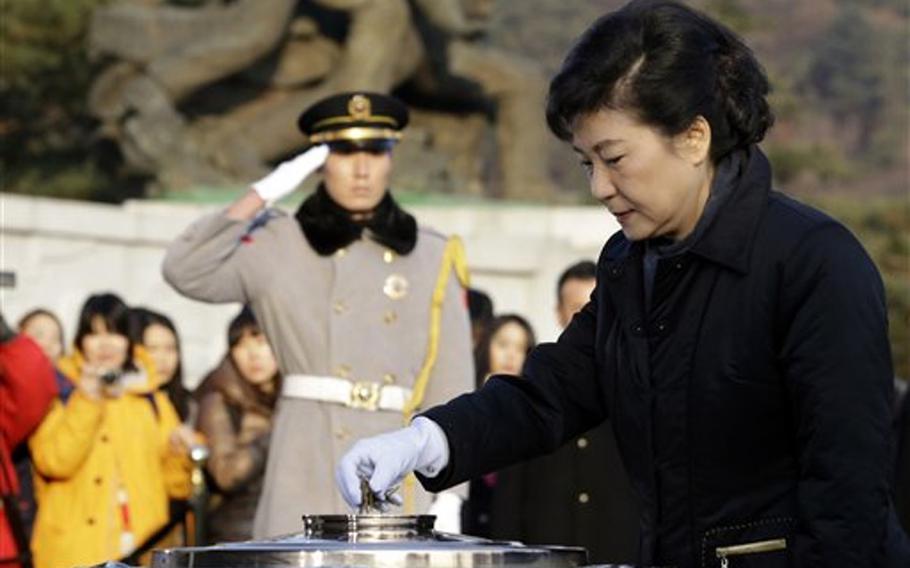Asia-Pacific
Security is new South Korean leader's primary focus
Stars and Stripes December 21, 2012

South Korean President-elect Park Geun-hye of the ruling Saenuri Party burns incense during her visit to the National Cemetery in Seoul, South Korea, Thursday, Dec. 20, 2012. Park, daughter of a divisive military strongman from South Korea's authoritarian era, was elected the country's first female president Wednesday, a landmark win that could mean a new drive to start talks with rival North Korea. (Lee Jin-man/AP)
SEOUL — South Korean’s new president is expected to be a strong supporter of Seoul’s alliance with Washington, though future provocations from North Korea could expose a split in how the two countries deal with the communist nation, analysts say.
Park Geun-hye of the ruling conservative Saenuri Party narrowly beat challenger Moon Jae-in on Wednesday and will replace incumbent Lee Myung-bak in February.
“Under Park Geun-hye’s government, there is no possibility that the U.S. and South Korea will have difficulties in their relationship,” said Hwang Jihwan, a professor of international relations at the University of Seoul.
Park will be the first female president in a Confucian society where few women advance to leadership positions in business or politics. Her father, former president and dictator Park Chung-hee, is remembered for guiding the once-impoverished country through a period of dramatic growth in the 1960s and ‘70s as well as for his human rights abuses.
Moon, a former human rights attorney, served as chief of staff to former President Roh Moo-hyun, a frequent critic of the U.S. who favored dialogue and openness with the North.
Both Park and Moon are generally considered to be pro-American, though Hwang said Moon likely would have tried to deepen South Korea’s ties with China at the expense of the relationship with the U.S.
Both candidates also favored greater engagement with the North than under Lee. However, experts say Park’s stance toward Pyongyang — peace, but not at the cost of security — is less accommodating that her opponent’s.
“They (Obama administration officials) were relieved because they remember how bad the relationship was when President Roh” was in office, said Kim Jiyoon, director of the Public Opinion Studies Center at the Asan Institute for Policy Studies.
However, the fledgling Park-Obama relationship could be tested soon. There is speculation North Korea is preparing a third nuclear test following last week’s successful launch of a long-range rocket, believed to be a test of technology aimed at reaching the continental U.S. one day.
Kim said strains between Washington and Seoul might emerge after a nuclear test.
“There might be some difference in the tone of their responses,” she said, with the U.S. being more critical of the North and appearing to take any provocations more seriously.
Park said Thursday her top priority is national security, according to Yonhap News:
“North Korea’s long-range missile launch symbolically showed how grave the security reality we face is,” she told reporters. “I will keep my promise to the people without fail that I will open up a new era of the Korean peninsula through strong national security and trust-based diplomacy.”
Lee’s hardline policies have prompted some to blame him for worsening relations with Pyongyang. During his tenure, the North has conducted nuclear and rocket tests, as well as two deadly attacks in 2010, against the Cheonan warship and Yeonpyeong Island.
Park will seek a delicate balance: show more flexibility and willingness to offer humanitarian assistance to the North than Lee, but not at the risk of alienating the U.S., said Yoo Chan-yul, a political science professor at Duksung Women’s University in Seoul.
“She believes the foundation of security is the U.S.-South Korean alliance,” he said. “Under Roh, we cooperated with North Korea too much. The current government contained North Korea too much.”